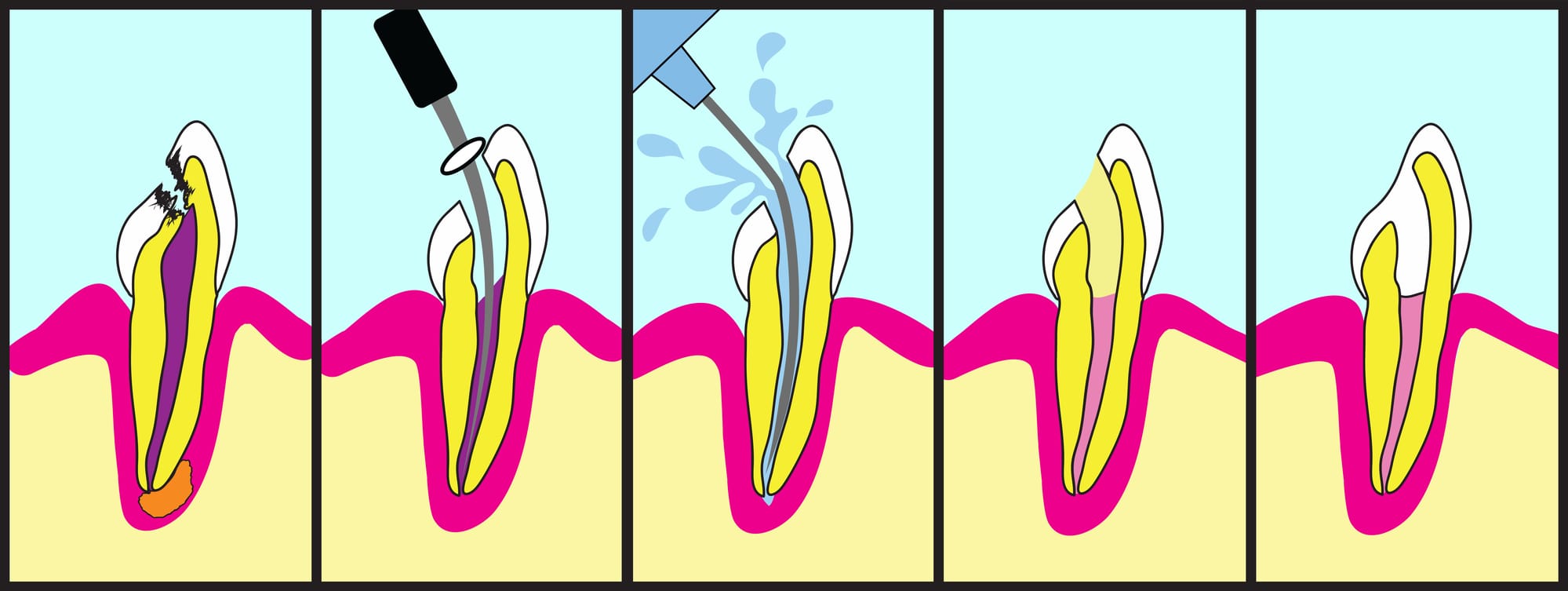
Root canal treatment aims to save teeth that are severely damaged by decay. During the treatment method, the pulp and nerve in the inside of the tooth are removed, then cleaned and sealed. If the tooth is not treated, the tissue around the tooth will be destroyed. It will expose more teeth and lead to loss of teeth.
Root canal treatment is done by a dentist, who is also an endodontist. An endodontist is a dentist who has the knowledge of diagnosing, treating and preventing dental pulp and nerve injuries. The dentist will take an X-ray to see the root canals and the infection. After this, the dentist will numb the flesh around the tooth. Anesthesia is done to make the patient comfortable and to relax. A sheet of rubber is then kept around the tooth to prevent saliva and keep the area dry.
The dentist will drill a hole to get to the inside of the tooth. The hole is used to disinfected and clean the affected pulp. Disinfectant or water will be flushed through the hole to get rid of the infection. The dentist may not seal the hole immediately but may insert medicine in the tooth for the bacteria to clear up. Alternatively, if the infection was not too much, the dentist may seal the hole to prevent contaminants such as food and saliva from getting in.
The dentist will monitor the healing of the tooth. Once it is good, they will put fillings and cover the tooth with a crown to protect it. The tooth crown will restore and protect the tooth from further infection. The appointments will reduce after you have fully recovered. An annual dentist appointment will be beneficial to check your overall oral health.
People fear root canal treatment because they assume it is a painful procedure. The treatment is relaxing and easy. It is more painful to stay with an infected tooth than to seek root canal treatment. Book an appointment with us today and find out more about this procedure.
What to expect after the Treatment
After the root canal treatment, you will experience high tooth sensitivity and tissue inflammation. You will also experience pain after anesthesia and sedative have cleared from your bloodstream system. The sensitivity and discomfort can be managed by taking pain killers.
You will be advised to take soft foods that are warm or cold. Hot foods will hurt you since the tissues around the tooth have not fully recovered. Go slow on your diet and allow the tooth plus the tissues to fully recover. Minimize chewing food with the tooth that is under treatment. This will prevent recontamination and breaking of the tooth before it is fully restored. Nothing is worse than treating reaffected teeth. Take care of your tooth as instructed by the dentist to avoid reoccurring bacterial infection.
Are Toot Canal Treatments Successful?
The success rate of root canal treatment is 95%. The treatment is a lifetime solution. The final step will involve adding a crown or a filling. This will not make it visible to other people. Therefore, you will not be self-conscious when you are talking with other people. Your smile will still be beautiful.
Root Canal Complications
Despite having 95% success, the treatment can result in complications. The complications include embedding asset override. This is a situation where one of the root canals is left untreated. This might have been unnoticed during the cleaning and the X-rays. This is why you need frequent dentist’s visit to check the recovery process. Inadequate sealing may leave a gap for contaminants to find a way to the pulp. This can lead to a second infection. The material that was used for filling may start fading away, leaving room for bacteria to accumulate and cause an infection.
All these complications can be controlled by frequent visiting the dentist after the treatment to check the progress. If you have a filling do annual visits to check if the filling is still in place. This will help minimize any complications. Follow the directives that the dentist will give you on how to take care of the tooth.
Root canal treatment is a safe dental procedure that will save your natural teeth.
